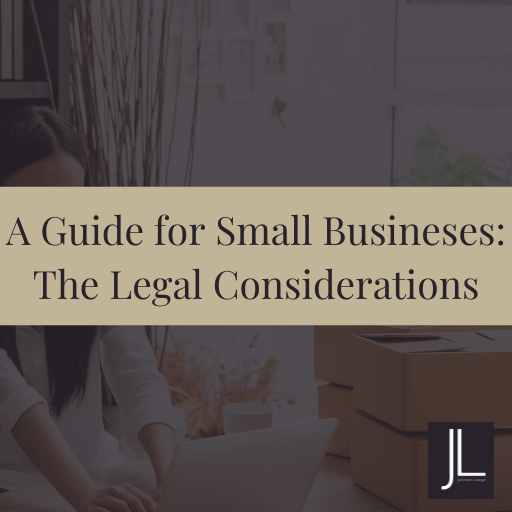
Even for small businesses, several legal considerations must be made to ensure you are compliant with the relevant regulatory body(ies) and make the processes easier for yourself in the long run, having set up your company by following the correct principles and procedures.
In this article, Jackson Longe’s experienced business law solicitors, based in Richmond, Surrey, explore some of the key considerations that should be made by new business owners when setting up a company.
What business structure do you want to adopt?
As a start-up, your business will likely be operated solely by you and perhaps one or two other employees. However, many people intend to expand, meaning considerations for the type of business structure you want to adopt are essential from the outset.
Although it is possible to alter your business structure later down the line, selecting the appropriate structure at the start will save time and capital on restructuring, something that will become increasingly complex the more your business grows.
The most common types of business structure include sole trader, limited liability partnership (LLP) and limited liability company. When selecting your structure, you should consider whether you require the protection of limited liability (for sole traders and partnerships, you assume personal liabilities for the running of the business).
The general rule is that, in any company structure, you are personally responsible for the liabilities you have chosen to guarantee.
As well as deciding the level of liability that you incur, you should also consider the tax structure that is most appropriate for your circumstances.
Speaking to a legal professional is essential for advice and guidance on these aspects.
Do you have the appropriate insurance?
Some business insurances are a legal requirement, such as employers’ liability insurance, whilst others, although not bound by law, are essential, too.
As with the above, understanding which insurance is essential for your firm will depend on the structure you adopt, as well as other key factors. Therefore, seeking the appropriate advice is advisable to ensure that essential information does not fall through the cracks.
How are you affected by data protection?
In the 21st century, all UK businesses are subjected to the laws and regulations surrounding General Data Protection Regulation (GDPR), and all companies and their owners should ensure that they are fully compliant with the elements that affect them.
Various aspects of a business are influenced by GDPR, including the company website and human resources (HR). Employees should undergo the appropriate training, and any updates should be monitored continuously to ensure they are being followed.
What about health and safety?
The Health and Safety Executive (HSE) publishes guidance on the legal provisions that must be made by all businesses to protect health and safety at work.
As with GDPR, the HSE guidelines are subject to frequent updates and should be monitored on an ongoing basis.
Failure to comply with the relevant requirements can result in personal liability, and criminal offences may sometimes apply.
How can you ensure your contracts are legally binding?
Your legal contracts will determine the general operations of your business, from how you interact with your clients and employees to where you are based and how potential disputes are managed and dissipated.
Your terms of business are vital to the running of your company. When you set up your firm, you should speak to a solicitor as soon as possible. They will be able to advise you on all aspects that should be included in your terms of business and other necessary documentation and contracts, including lease agreements, employment contracts, vendor agreements and shareholder agreements.
How is your business affected by employment law?
In the UK, all businesses are affected by employment law in one way or another. At a minimum, any employees you hire should receive a written statement of their employment terms, including the particulars set out by law.
Many provisions deemed essential for businesses to include in their employment contracts are often not required by law. This includes confidentiality and provisions preventing a departing employee from poaching clients. However, this is not to say that such clauses are not vital in a business’ employment contracts.
In most cases, the more detailed an employment contract, the better, as it leaves less room for interpretation and, therefore, dispute or unwelcome circumstances.
Legal Support for Small Businesses
According to research carried out by Legal Board Services (LSB), it is estimated that the financial impact of legal problems experienced by all small businesses in 2017 was £40 billion, and over 1.1 million individuals suffered from related ill health.
At Jackson Longe, we understand the overwhelming nature of starting and managing a small business. We are proud to offer a Business Start-Up pack, including information and advice on the following matters:
- Sole Trader or Company or Partnership.
- Memorandum and Articles of Association.
- Terms and Conditions of Business.
- Securing a Trademark and other related intellectual property rights.
- Commercial Contracts.
- Investor Agreements and Venture Capital Agreements.
- Commercial Legal Charge and Debentures.
- Partnership Agreements.
- Directors’ Agreements.
- Much more.
For further information on this, please click here.
You can also read our previous article – Do I need a solicitor to set up a business in the UK?
To speak to a member of our professional business law team today about your start-up, SME or medium-sized business, please call 0208 332 2069 or email info@jacksonlonge.com. Alternatively, you can fill in our contact form.